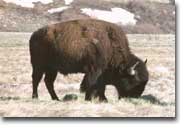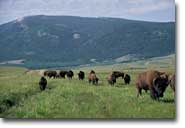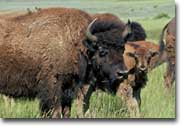|
Click on any image for a larger view |
||
|
This ranch is a prime example of "Wild Spaces, Working Places," The Nature Conservancy's motto for ranches that continue operating in their agricultural legacies, yet work to combine their profit goal with high regard for and preservation of the natural order of their ecosystems. For these reasons, the ranch supplements its traditional agricultural revenues by conducting limited big game hunts, trout fishing on its lakes and nearby rivers, and receives small corporate groups interested in the privacy the ranch can offer. In 1998, Elk Mountain Ranch imposed a conservation easement on its lands, thus assuring for posterity that these notions of careful land stewardship will be observed and continued.
Our pasture rotation program depends on the amount of rainfall in each different grazing area and the rainfall is monitored by 18-different rain gauges. Management adjusts grazing to differences in the amounts of forage available and assures that ample forage is left behind in wildlife migratory areas. Repeat grazing visits to specific areas depend on whether sufficient "rest" has been provided each area. Electric fences of only two- and three-wires control the buffalo and provide easy and safe passage for wildlife. The predominant root stock of the Elk Mountain Ranch buffalo/bison herd is from the Durham Ranch in northeast Wyoming. Durham Ranch is one of the oldest buffalo operations in North America and some of its gene pool comes from the few bison saved by Montana ranchers in the 1890's. These genes are mixed with those from the Custer State Park bulls and others, as appropriate to provide new genes from different geographic areas.
Inquiries about our bison operation may be emailed to office1@elkmountain.com. Box
74, Elk Mountain, Wyoming 82324 Back to Top |



